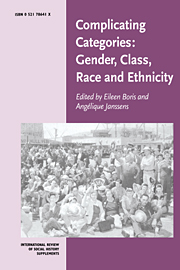Book contents
- Frontmatter
- Contents
- Notes on Contributors
- Complicating Categories: An Introduction
- Family Concerns: Gender and Ethnicity in Pre-Colonial West Africa
- Narratives Serially Constructed and Lived: Ethnicity in Cross-Gender Strikes 1887–1903
- Competing Inequalities: The Struggle Over Reserved Legislative Seats for Women in India
- “The Black Man's Burden”: African Americans, Imperialism, and Notions of Racial Manhood 1890–1910
- Sex Workers or Citizens? Prostitution and the Shaping of “Settler” Society in Australia
- From Muscles to Nerves: Gender, “Race” and the Body at Work in France 1919–1939
- “Blood Is a Very Special Juice”: Racialized Bodies and Citizenship in Twentieth-Century Germany
“Blood Is a Very Special Juice”: Racialized Bodies and Citizenship in Twentieth-Century Germany
Published online by Cambridge University Press: 14 January 2010
- Frontmatter
- Contents
- Notes on Contributors
- Complicating Categories: An Introduction
- Family Concerns: Gender and Ethnicity in Pre-Colonial West Africa
- Narratives Serially Constructed and Lived: Ethnicity in Cross-Gender Strikes 1887–1903
- Competing Inequalities: The Struggle Over Reserved Legislative Seats for Women in India
- “The Black Man's Burden”: African Americans, Imperialism, and Notions of Racial Manhood 1890–1910
- Sex Workers or Citizens? Prostitution and the Shaping of “Settler” Society in Australia
- From Muscles to Nerves: Gender, “Race” and the Body at Work in France 1919–1939
- “Blood Is a Very Special Juice”: Racialized Bodies and Citizenship in Twentieth-Century Germany
Summary
The 1999 plan of the Social Democratic government to adjust Germany's 1913 nationality law has generated an intensely emotional debate. In an unprecedented action, the opposition Christian Democrats managed to gather hundreds of thousands of signatures against the adjustment that would have granted citizenship to second generation “immigrants” born in Germany. At the end of the twentieth century, Germans still strongly cling to the principle of jus sanguinis. The idea that nationality is not connected to place of birth or culture but rather to a “national essence” that is somehow incorporated in the subject's blood has been strong in Germany since the early nineteenth century and has been especially decisive for the country's twentieth-century history.
The myth of blood has intertwined with that of “race”; both imply the heredity of mental traits that connect people otherwise not related. Images of race belong to the West's “deep structure”, voiced in different manners and to different degrees in different political systems and times, but always there. The conjuncture of “race” and “blood” therefore, has proven resistant to political changes. Germany, with its national identity that through almost the whole of the twentieth century and four political systems has been explicitly based on “blood”, is a case in point.
This article explores the roots of the German self-definition in larger Western concepts of identity that are deeply racialized and often manifested through gendered constructions relating to sexuality. Legal exclusion generated by those concepts centered on “race” rather than other possible forms of distinction.
- Type
- Chapter
- Information
- Complicating Categories: Gender, Class, Race and Ethnicity , pp. 149 - 169Publisher: Cambridge University PressPrint publication year: 2000



